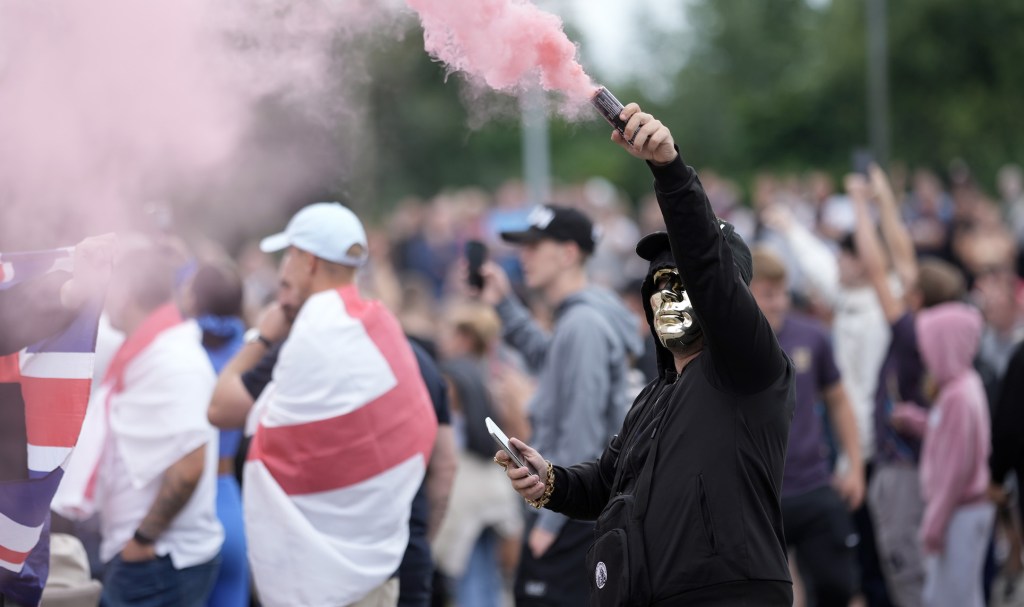UK riots: ‘I’m a trans Muslim – all marginalised communities must stand against violence’

Far-right violence has spread across the UK. (Drik/Getty)
“Are you sure you want to go around London? It’s not safe,” I asked my best friend, a Brown gay man, when we were discussing what to do the next time we see each other.
Usually, I would say yes to exploring London: discovering museums, going to Gay’s the Word bookshop. However, the recent violence around the UK has left me fearful to step outside my South Asian community.
As a trans Muslim, the weight of racism, Islamophobia and transphobia feels especially heavy. There is increased public hostility – making simple acts such as wearing traditional attire unsafe – and intensified prejudice, furthering the feeling of isolation.
Having been born and raised in West London in the 2000s, I was fortunate to be part of a huge Muslim community where we would celebrate Eid together, and walk to the local mosque in our abayas and thobes. But Islamophobia was prevalent, especially in various media outlets that spread misinformation, demonising Muslims, refugees and migrants, and there was aggression around the UK. It still is so prevalent.
I remember, in 2018, my friends and I were in a state of panic at school because of a leaflet that targeted our community on one specific day. We were so terrified that none of us dared leave the house. People I knew, unaware, would ask if I wanted to go out. I said: “No, it’s too dangerous for us.”
The fear of being targeted or attacked left us feeling trapped. These moments and the hate crimes we are seeing right now highlight how quickly safety can become a privilege rather than a given right.

Additionally, homophobia and transphobia are on the rise, because of the misinformation and the spread of harmful stereotypes, where particularly trans people of colour often bear the brunt of the hostility. The intersection of racism, Islamophobia and homophobia complicates our lives, creating a web of oppression that forces many to live in constant vigilance. For me, it feels like navigating a maze just to exist.
My childhood was rampant with homophobia and transphobia, influenced by traditional values and the lasting effects of Section 28, and it made talking about LGBTQ+ identities taboo, leaving me to deal with internalised homophobia.
These intersecting identities mean that my existence is often seen as an anomaly or a threat – the challenges I, and many, face are not simply dealing with one form of prejudice, but multiple layers of discrimination – and the lack of understanding of our experiences in the media adds to the feeling of loneliness and invisibility, as our realities are frequently ignored or misrepresented.
The combined weight of these oppressions creates a continuous struggle for acceptance, safety and equality, highlighting the urgent need for more nuanced and inclusive advocacy.
The marginalisation we face is systemic, affecting every aspect of our lives, from healthcare to employment. Whether it’s navigating a workplace where gender identity or religious beliefs might not be understood or accepted, or seeking medical care where needs might be overlooked, it is clear that marginalised groups face a cycle of disadvantages.
To break this cycle, it is essential to address these systemic issues with support and inclusivity that recognise the complex realities of intersecting identities.
Despite the challenges, however, we have also seen strength and resilience in our communities. We have seen volunteers cleaning up the streets, protestors defending places of worship and spaces for refugees and migrants, and we have heard people speaking out against injustice. We have seen marginalised groups come together to stand for equality.
In the face of this recent violence, marginalised communities must stand in solidarity. We must foster empathy across all communities, support one another, and advocate for policy reforms that protect vulnerable groups. Every one of us can make a difference.
For me, creating a safe space, where stories can be heard, is important because it ensures no one feels alone in their struggle. And I remain hopeful that every aspect of identity is celebrated rather than feared.
Rayyan is an ambassador for Just Like Us, the LGBT+ young people’s charity. You can volunteer or support their work today.
How did this story make you feel?

